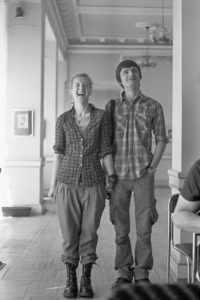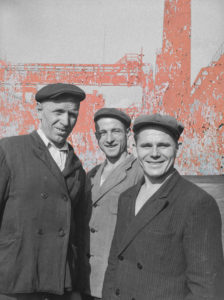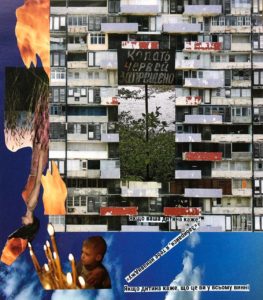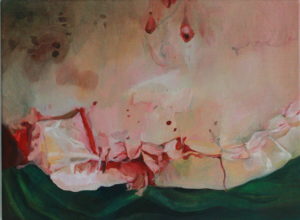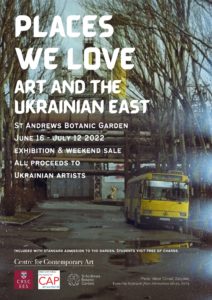Places We Love:
Art and the Ukrainian East
St Andrews Botanic Garden
June 16th-July 24th 2022
Places We Love: Art and the Ukrainian East features the work of four contemporary Ukrainian artists: Viktor ‘Corwic’ Zasypkin, Masha Pronina, Oleksandr Kuchynskyi and Darya Tsymbalyuk. Ranging from photography to montage to painting, these works provide insights into industrial heritage, pre-war cityscapes, the violence of military incursions, and the multiple lives and loves of the Donbas region. Donbas (Donetsk Coal Basin) is an industrial region in the east of Ukraine, which since 2014 has been partially occupied by Russia, and where war has been ongoing for eight years.
Places featured in this exhibition are dear to the artists. Many of them are now being destroyed by the Russian military.
Artworks will be on display in The Garden Bothy and The Pergola.
The exhibition is accompanied by a weekend print sale, with all proceeds going to Ukrainian artists.
Places We Love has been organised by the Centre for Contemporary Art in collaboration with the Centre for Russian, Soviet, Central and East European Studies and the Centre for Art and Politics at the University of St Andrews, and kindly hosted by the St Andrews Botanic Garden. The exhibition is co-organised by Catherine Spencer, Darya Tsymbalyuk, Victoria Donovan and Kate Cowcher.
Places We Love has developed from the book Limits of Collaboration: Art, Ethics and Donbas (Kyiv: Rosa Luxembourg Stiftung, 2022), written by Victoria Donovan and Darya Tsymbalyuk with Dmytro Chempurnyi, Viktor ‘Corwic’ Zasypkin, Oleksandr Kuchynskyi and Katerina Siryk.
Places We Love Artists
Viktor “Corwic” Zasypkin
Viktor ‘Corwic’ Zasypkin is an artist and graphic designer from Donetsk, and co-founder of the artist collective zhúzhalka group. Working in a range of media, particularly photography, his work has chronicled the changing landscape of Donbas region. His work here is from three series: Donetsk: Home, Sweet Home (2012), Postcards from Rzhavchino (2014) and The Pink Sky of Donetsk (2020).
https://cargocollective.com/corwic/Info
Oleksandr Kuchynskyi
Oleksandr Kuchynskyi is an artist who was based in Sievierodonetsk until the 2022 escalation of Russia’s war on Ukraine. Oleksandr’s work has documented the de-industrialising landscape of eastern Ukraine, and he is the founder of the Instagram account <<Індустріяльний рай>> or Industrial Heaven, a visual archive of Donbas region. Places We Love features six works from the De?Industry series, based upon the collections of the Mariupol Local History Museum.
Instagram: @industrialheaven, @olexkuchynskyi
Masha Pronina
Masha Pronina is an artist from Donetsk. Displaced by the war, she is currently moving around Ukraine assisting children and teenagers, an extension of her art therapy work with traumatised young people. She previously worked at Platform TU, an art center in Mariupol that supported teenagers from marginalised groups. Exhibited here is work from a series entitled «Я вам покажу декоммунизацию» or I’ll show you decommunisation. Individual titles were lost as Masha moved between cities.
Instagram: @ibupron
Darya Tsymbalyuk
Darya Tsymbalyuk researchers, writes and draws. Born and raised in Mykolaiv, for the past four years she has lived in St Andrews. The visual work that she presents here engages the palaeobotanical history of Donbas region, as well as reflects on the ongoing Russia’s war on Ukraine. Darya completed her PhD at University of St Andrews in 2021, and her dissertation focused on human-plant relations in stories of displacement from Donbas.
